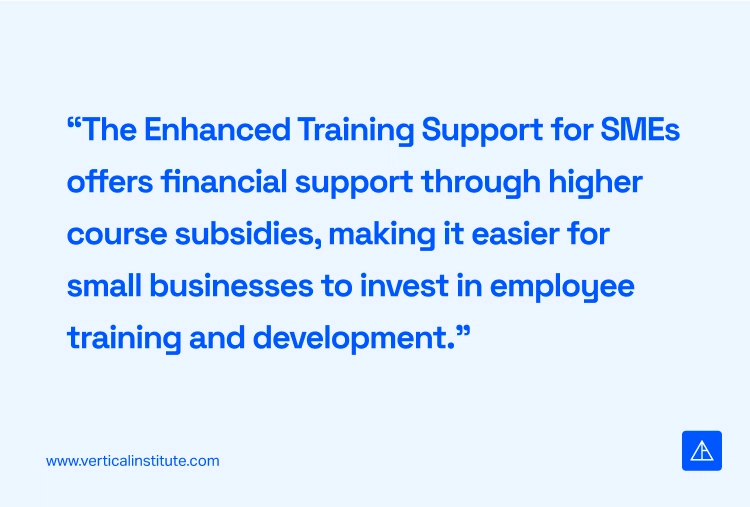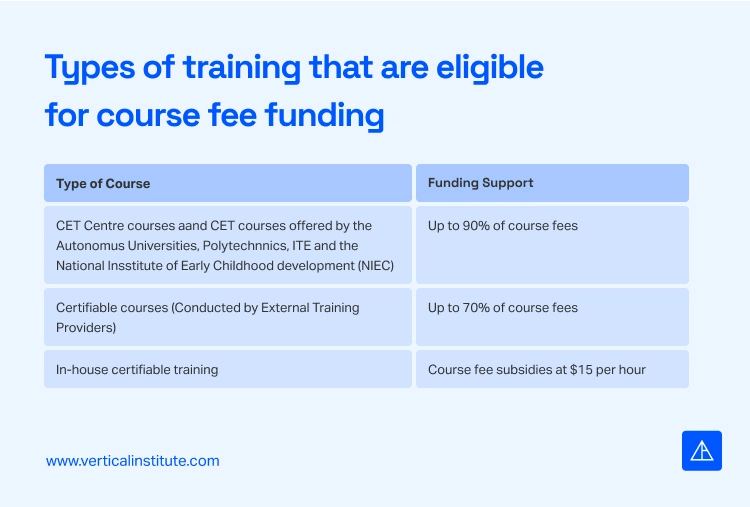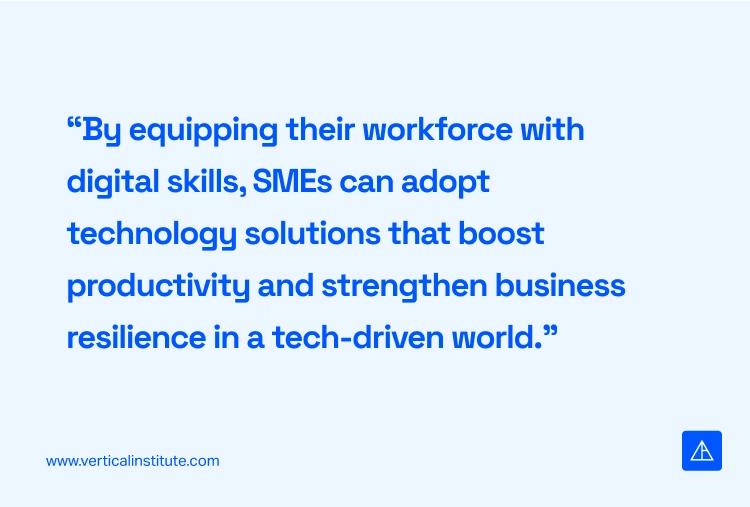Singapore’s Enhanced Training Support for SMEs: 5 Key Insights for Employers
This article tackles how the Enhanced Training Support for SMEs helps small and medium-sized enterprises in Singapore adapt to the digital economy’s demands. Focusing on the benefits of upskilling and industry-specific training explains how SMEs can stay competitive and build a resilient workforce.
by Vertical Institute • 20 September 2024 • minutes read
Singapore has consistently prioritised upskilling its citizens to meet the demands of digital transformation. Through initiatives like SkillsFuture, the government offers funding to help individuals and SMEs acquire skills in emerging technologies. This ensures the workforce stays competitive in a rapidly evolving economy driven by AI, automation, and data analytics advancements.
One key initiative supporting SMEs is the Enhanced Training Support for SMEs (ETSS). Let’s explore what ETSS entails and how it benefits employers and the workforce.
Related: How To Secure Artificial Intelligence Jobs in Singapore
What is the Enhanced Training Support for SMEs?
The Enhanced Training Support for SMEs is a Singapore government initiative that helps small and medium-sized enterprises (SMEs) upskill their employees to stay competitive. It provides financial support through higher subsidies for approved courses. This makes it easier and more affordable for SMEs to invest in employee training and development, keeping their workforce prepared for the digital economy.

Focusing on upskilling is essential, especially as Singapore continues to close the AI skills gap to support sustainable economic growth. According to Eco-Business, the country is pushing forward with AI adoption, but there remains a shortage of skilled talent to fully harness its potential. Programmes like ETSS are crucial in addressing this gap by equipping employees with the necessary skills. This benefits SMEs and supports Singapore’s broader innovation and economic resilience goals.
Here’s how both employers and the workforce can benefit from this initiative:
1. Financial Support for Employee Training
Under the Enhanced Training Support for SMEs, SMEs can sponsor their employees for continuing education and training (CET) courses and receive subsidies of up to 90% of course fees. Additionally, employers of low-wage workers can receive further funding under the Workfare Training Support (WTS) scheme, with course fee funding ranging from 90% to 95% for Workforce Skills Qualifications (WSQ) training.
Below are the types of training that are eligible for course fee funding:

2. Diverse Skill-Building Pathways for Employees
As highlighted in Budget 2024, the focus is on equipping the workforce with relevant skills through SSG-supported courses. These courses cover various areas, including digital transformation, leadership, and sector-specific training, ensuring employees are well-prepared for their industries’ changing demands. Mid-career workers, particularly those aged 40 and above, receive additional support to enhance their career prospects through targeted upskilling opportunities.
3. Flexible Training Options to Suit SME Needs
The ETSS offers a wide range of flexible training formats to accommodate SMEs’ diverse needs and schedules. These include SSG-supported short courses provided by the Autonomous Universities, as well as various part-time programmes such as:
- Part-time Diploma, Advanced Diploma, and Specialist Diploma
- Part-time Industry Skills Certificates (ISC)
- SkillsFuture Work-Study Diploma
- Part-time NITEC and Higher NITEC programmes
- Certificate-level courses
These flexible options allow employees to pursue training without disrupting day-to-day business operations, ensuring ongoing professional development.
4. Focused Skills Development for Industry-Specific Needs
SMEs can upskill their workforce in areas directly relevant to their industry, whether in healthcare, logistics, finance, manufacturing, or tech-focused sectors. These programmes cover technical and digital skills, including vital tech training in data analytics, artificial intelligence, cybersecurity, and digital transformation.
For example, SMEs can take advantage of courses offered by Vertical Institute, such as Data Science and UI/UX Design, which provide practical skills in understanding data mining and designing user-friendly digital products.
5. Support for SMEs in Adopting Digital Solutions
According to a Straits Times roundtable, the increasing need for digital skills is tied to the advancement of technology and the ageing workforce in Singapore. As businesses adapt to these changes, upskilling employees in digital capabilities is critical for long-term growth and sustainability.

Integrating digital solutions can drive business innovation, improve decision-making through data insights, and open new opportunities for SMEs to thrive in the modern economy. By equipping their workforce with digital competencies, SMEs are better positioned to adopt and implement technology solutions that boost productivity and ensure business resilience in an increasingly tech-driven world.
Related: 5 Ways to Maximise Singapore’s Course Subsidies For Your Career Growth
What Are the Criteria for the Enhanced Training Support for SMEs?
SMEs in Singapore can apply for the ETSS if they meet the following criteria:
Business Criteria
- Registered and operating in Singapore.
- Have at least 30% local shareholding.
- The company’s annual sales turnover must not exceed S$100 million or employ no more than 200 workers.
Employee Eligibility
- Employees must be Singapore citizens or permanent residents whose employers sponsor them for the training.
Related: How PRs and Singaporeans Can Use SkillsFuture Credits
Can Employers Apply for Absentee Payroll Funding and Enhanced Training Support for SMEs?
Yes, employers can apply for Absentee Payroll Funding alongside the Enhanced Training Support for SMEs. While ETSS covers some course fees, Absentee Payroll Funding provides additional support by reimbursing part of the wages for employees attending training during working hours. This allows SMEs to benefit from course subsidies and wage compensation, making it easier to upskill their workforce without significant financial strain.
Related: What Employers Need to Know About Absentee Payroll Funding this 2024
Conclusion
The digital transformation journey for SMEs is inevitable, but the Enhanced Training Support for SMEs makes it more accessible through subsidies, industry-specific training, and flexible learning formats. This programme supports business resilience and employee growth, helping SMEs address challenges like the AI skills gap and an ageing workforce.
When combined with absentee payroll funding, upskilling becomes a strategic investment for employers, enabling them to stay competitive and innovative in a tech-driven economy. ETSS offers a comprehensive approach to workforce development, empowering businesses and employees to thrive in the digital future.
Empower Your Workforce with Future-Ready Skills Through Enhanced Training Support for SMEs!
Take full advantage of the Enhanced Training Support for SMEs (ETSS) to upskill your workforce and stay competitive in the digital economy. Partner with Vertical Institute to access expert-led, industry-relevant courses and enjoy the financial benefits and flexibility ETSS offers. Start your upskilling journey today by visiting Vertical Institute’s Corporate Training Programs.
About Vertical Institute
Vertical Institute stands at the leading edge of evolving work landscapes. Our core mission is to prepare individuals with the necessary skills for future career success. We are dedicated to providing advanced tech education and cultivating leaders, innovators, and changemakers through our premier technology courses and certifications.
As a certified Approved Training Provider (ATO) recognised by SkillsFuture Singapore (SSG) and the Institute of Banking & Finance Singapore (IBF), Vertical Institute offers state-of-the-art, government-subsidised tech courses. Participants in our programs are eligible for SkillsFuture Credits and NTUC UTAP Funding, which helps alleviate education costs.